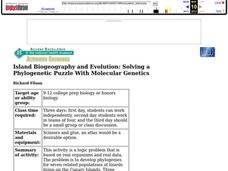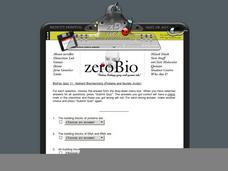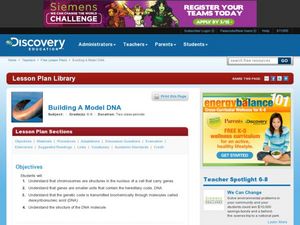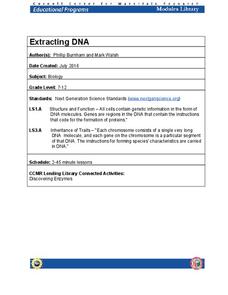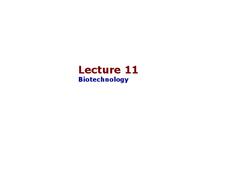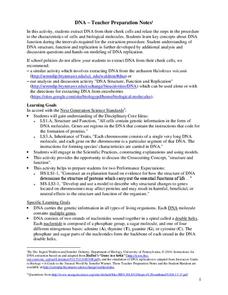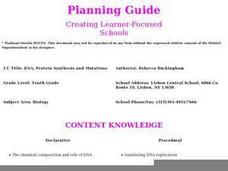Curated OER
Island Biogeography and Evolution
High schoolers use this activity as a logic problem that is based on real organisms and real data. The problem is to develop phylogenies for seven related populations of lizards living on the Canary Islands. Three phylogenetic charts...
Curated OER
Happy Face Spider Propagation
Young scholars research genetic adaptations. In this chromosome lesson, students investigate dominant and recessive genes using spiders indigenous to Hawaii. Young scholars create Punnett squares to determine the probability of passing...
Curated OER
The Watson-Crick Model of DNA Structure
Junior geneticists construct models of DNA to discover sequencing and pairing of nucleotides. They use the models to simulate protein synthesis and then translate the codes into physical traits. Finally, they use the traits to create a...
Cold Spring Harbor Laboratory
RNA Is an Intermediary Between DNA and Protein
For years, scientists believed tRNA was junk left over from larger RNA. Three scientists used different approaches to prove tRNA actually exists as the connection between DNA and protein. Learn about their experiments, their lives, and...
Curated OER
Cut-off Genes
Investigate the relationships between different deep-sea organisms by DNA sequencing. A worksheet provides instructions for DNA sequencing and space to work. They simulate gel electrophoresis by cutting out paper "DNA strands."...
Cold Spring Harbor Laboratory
Living Things Share Common Genes
Everything evolved from a common ancestor, but how did modern plants and animals develop so many more genes? Scholars use an online interactive to learn about the process. They begin to understand common genes with an animation, multiple...
Curated OER
BioFax Quiz 11 - Nutrient Biochemistry
Here is a quick online quiz on the basics of the DNA molecule. Biology buffs can choose one of five answers for each of the 10 questions and submit the quiz when they are finished. They receive immediate feedback on their performance,...
Curated OER
Building a Model DNA
Learners explain the function of DNA in the body. In this biology lesson, students build a DNA model using simple materials. They demonstrate how bases pair up in the helix.
University of Minnesota
Dendritic Spines Lab
This is your brain on drugs ... literally! Your neuroscientists-in-training examine the evidence of drug use on the human brain and how neurons change their connectivity when altered by drugs. They then work together to create testing...
Cornell University
Extracting DNA
Uncover the basics of DNA structure through exploration activities. Collaborative groups build DNA models and recreate the process of replication. Then, using plant cells such as peas or strawberries, they extract a DNA sample.
Serendip
The Molecular Biology of Mutations and Muscular Dystrophy
Different types of mutations cause unique types and degrees of muscular dystrophy. Scholars learn about the types of mutations and the impact on the body. They compare the location of the mutations and draw conclusions about how it is...
Curated OER
Biotechnology
The metaphors used here to describe the "cut and paste" procedures for genetic engineering will really help your biologists in their understanding of restriction enzymes and DNA. The uses of genes that are isolated and incorporated...
Curated OER
Mutations and Gene Regulation
Teenaged scientists can use this quiz or study guide to show off their understanding of genetic mutations and their causes; includes short answer, multiple choice, matching, and more.
Curated OER
Extracting DNA from Your Cells - Teacher Preparation Notes
Students extract their own DNA from cheek cells. In this biology instructional activity, students explain the replication process. They identify the structure and composition of DNA.
Curated OER
DNA, Protein Synthesis and Mutations
Tenth graders investigate the chemical composition of DNA and RNA and how they work together to synthesize protein. They discover genetic codes, gene chromosome theory, and how the environment influences our appearance.
Curated OER
Protein Synthesis
In this protein synthesis worksheet, students use a given strand of DNA to write the complimentary base pairs. They transcribe the message to the RNA and then they translate the message into the proper amino acids using the codons on the...
Curated OER
Cutt-Off Genes
High schoolers explore how gene sequence analysis can be used to examine phylogenetic similarities of different organisms. Students work in groups to simulate a gel electrophoresis separation of fragments using poster board to create...
Curated OER
Using Blood Tests to Identify Babies and Criminals
Students solve a crime by matching a suspect's blood type to physical evidence collected at the crime scene. In this forensic science lesson, students identify the different blood types. They explain how blood tests work.
Curated OER
Reading the Code
In this DNA worksheet, students access a website to read about the scientists who make significant contributions to the DNA puzzle. Students complete 7 short answer questions based on the reading. Then students complete 3 short answer...
Cold Spring Harbor Laboratory
Some DNA Does Not Encode Protein
Roy John Britten easily earned a PhD in nuclear physics—but he found painting with water colors too difficult. Young scientists learn about Britten's life, career, and research with an online interactive. They read a biography, view...
Curated OER
Implications of the Human Genome Project
Students study the Human Genome Project through classroom discussion and the video, Cracking the Code of Life. They research reports about the issues of disease, human health, and the ethical, legal, and societal implications of the...
Curated OER
Sociobiology: Heredity Factors
Students examine DNA replication and how proteins are synthesized from DNA codes and continue to explore the effects of genetics in additional lessons. Among the topics covered are: protein synthesis, cell chemistry, environmental...
Curated OER
And the Verdict Is...
Young scholars identify the unique pattern DNA forms in each individual, and how that pattern can be used to identify criminals. They have the opportunity to simulate the process of matching DNA samples to those taken at a crime scene.
Curated OER
The Spanish Omelet
High schoolers use analogies to show the relationships among cell, nucleus, genes, chromosome, ribosome, replication, mitosis, transcription, translation, DNA, RNA, amino acids and proteins, genotype, phenotype, and genetics vs....


